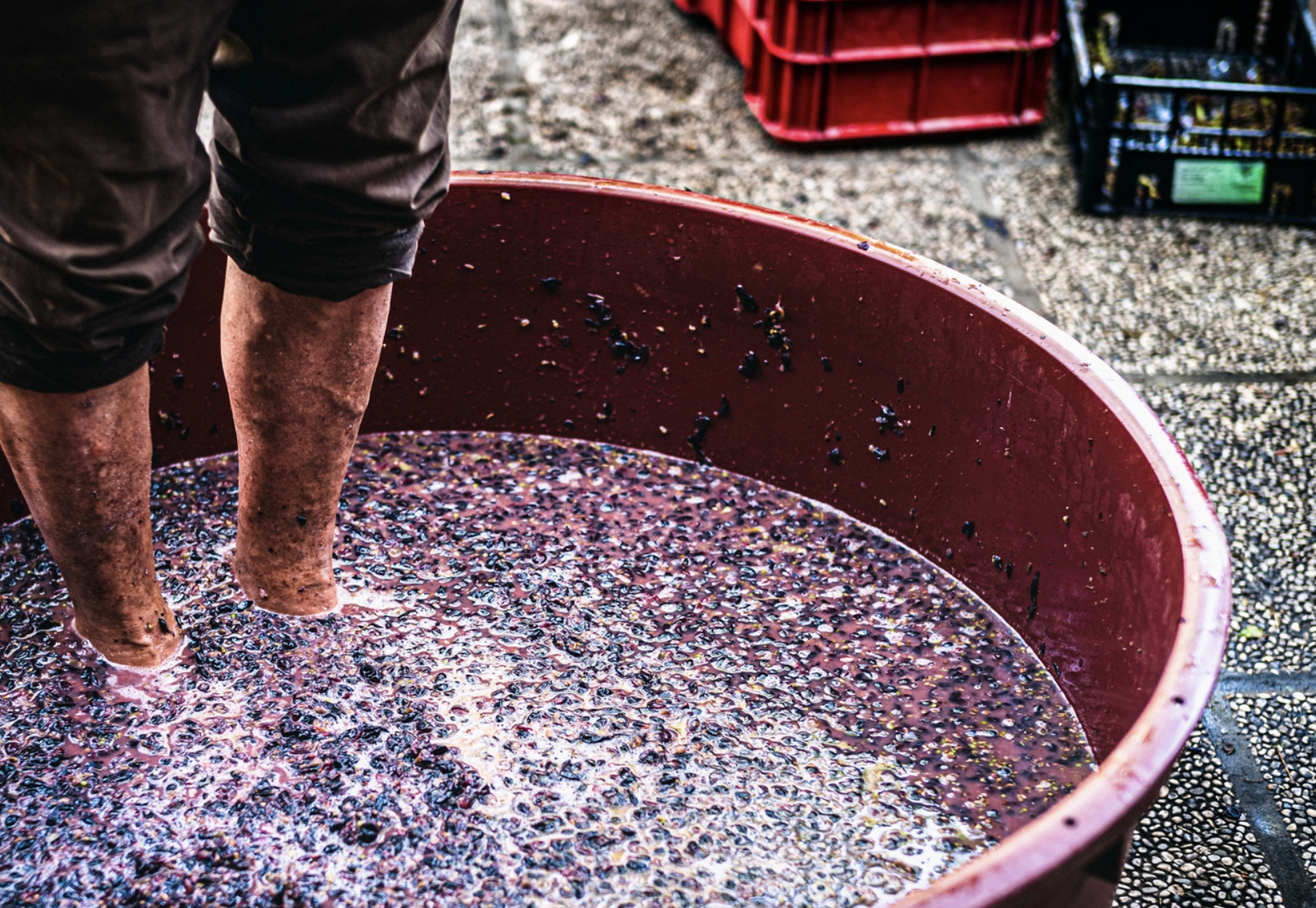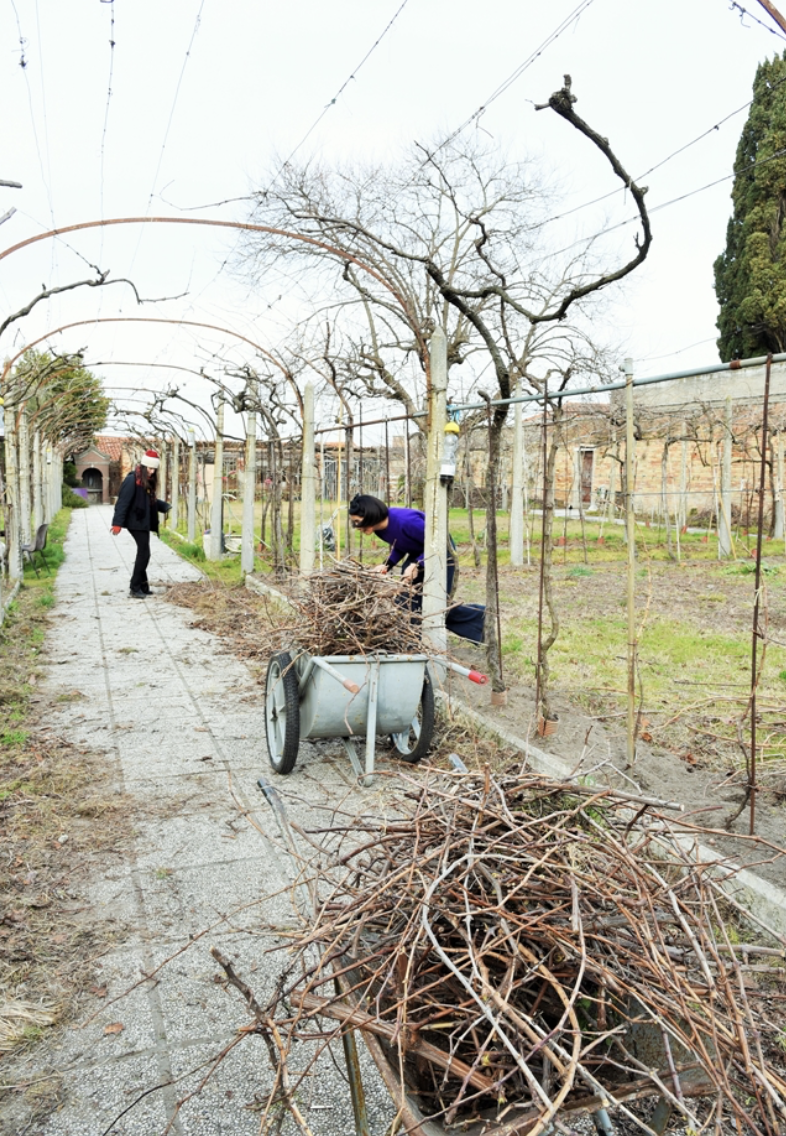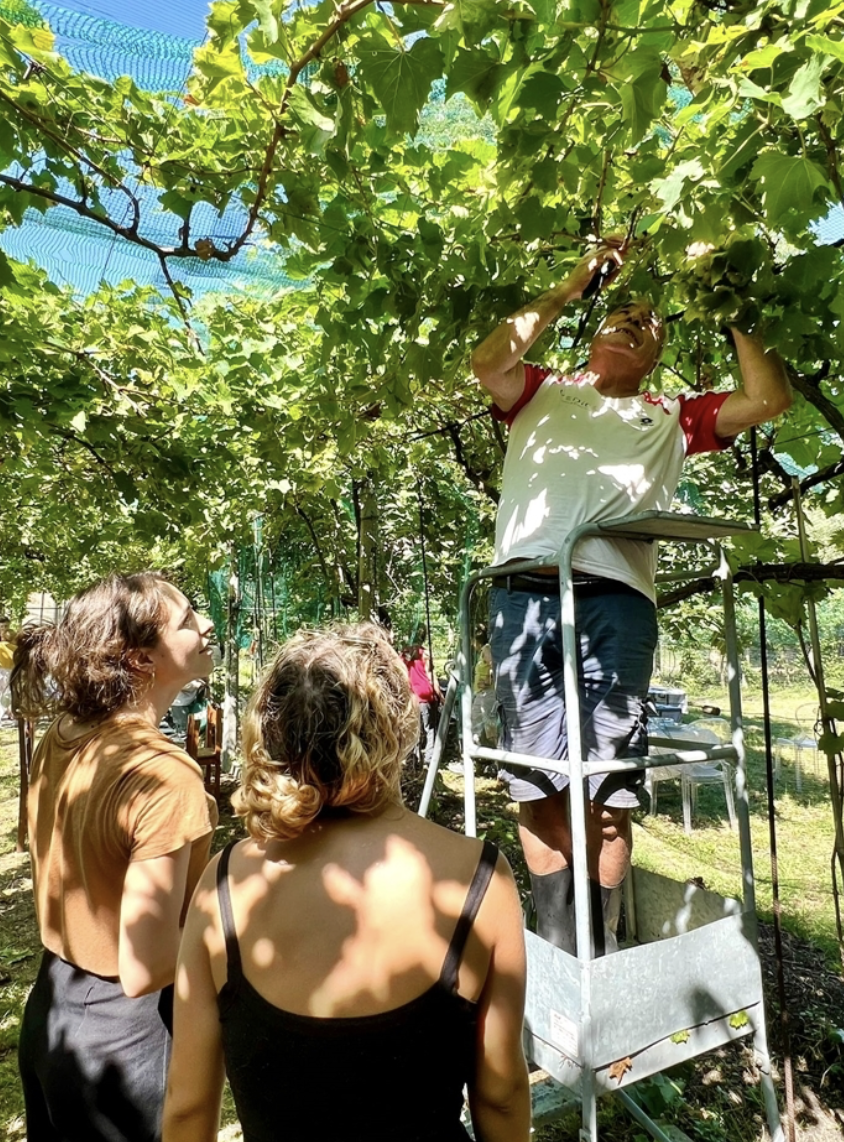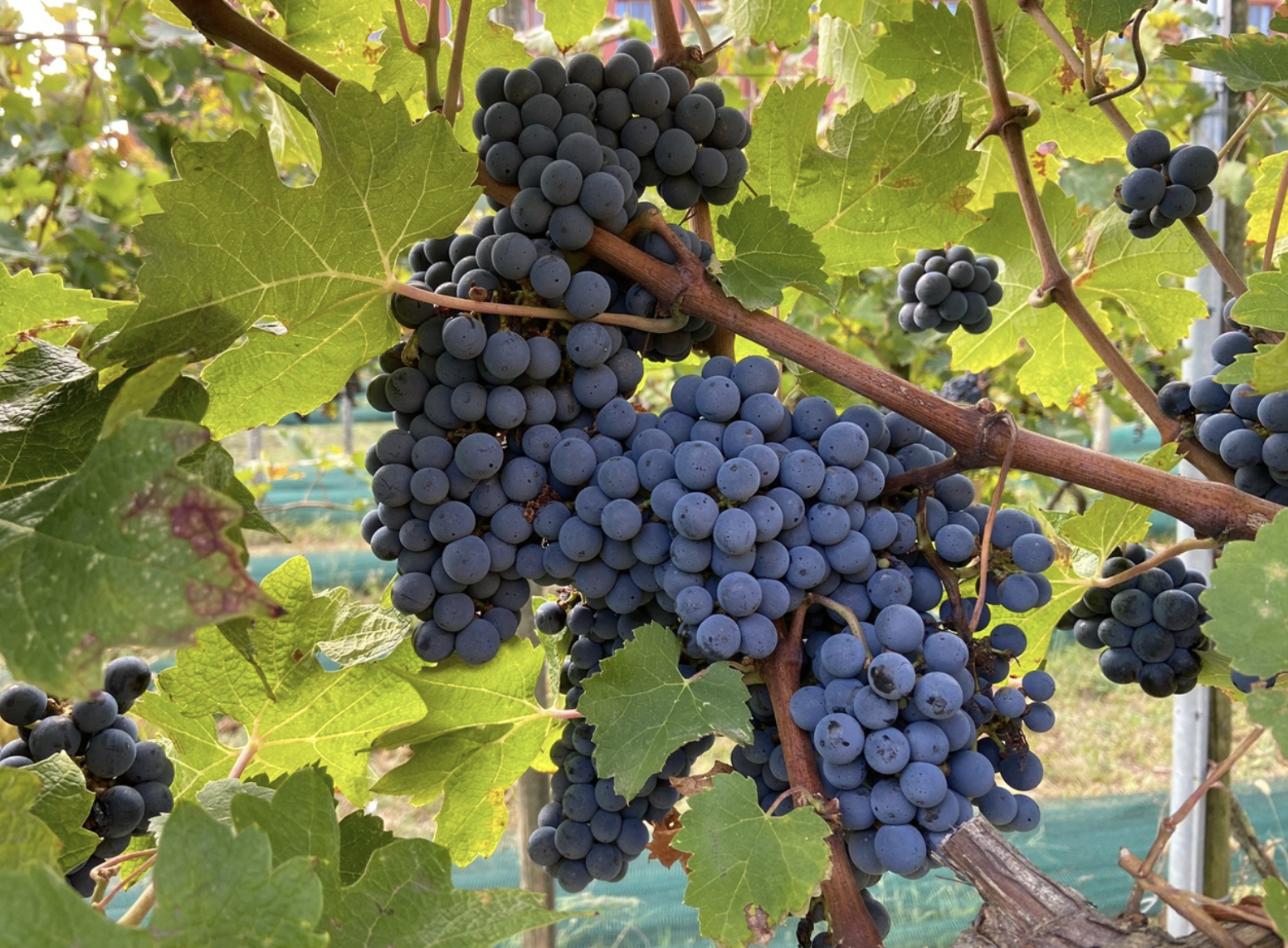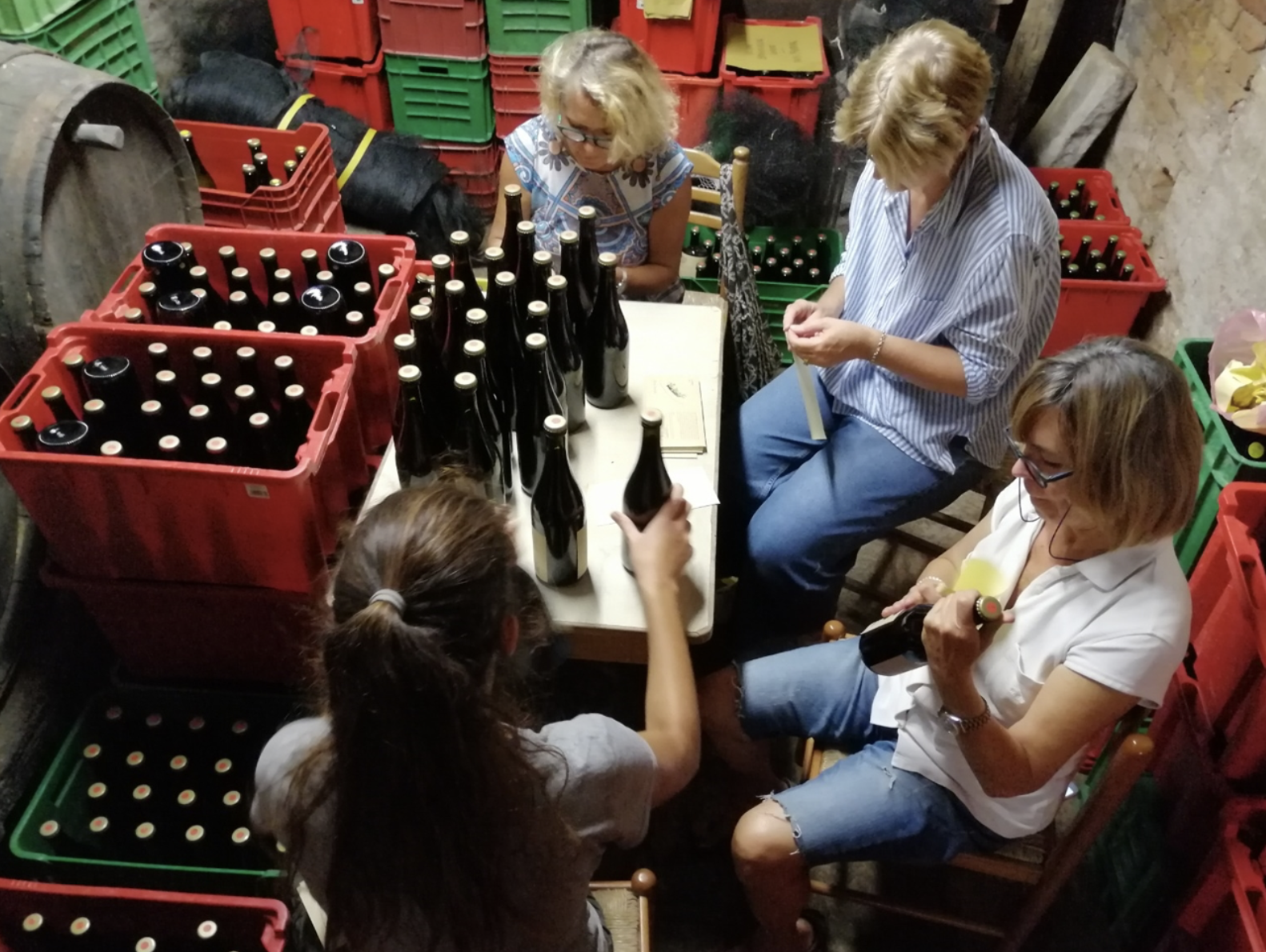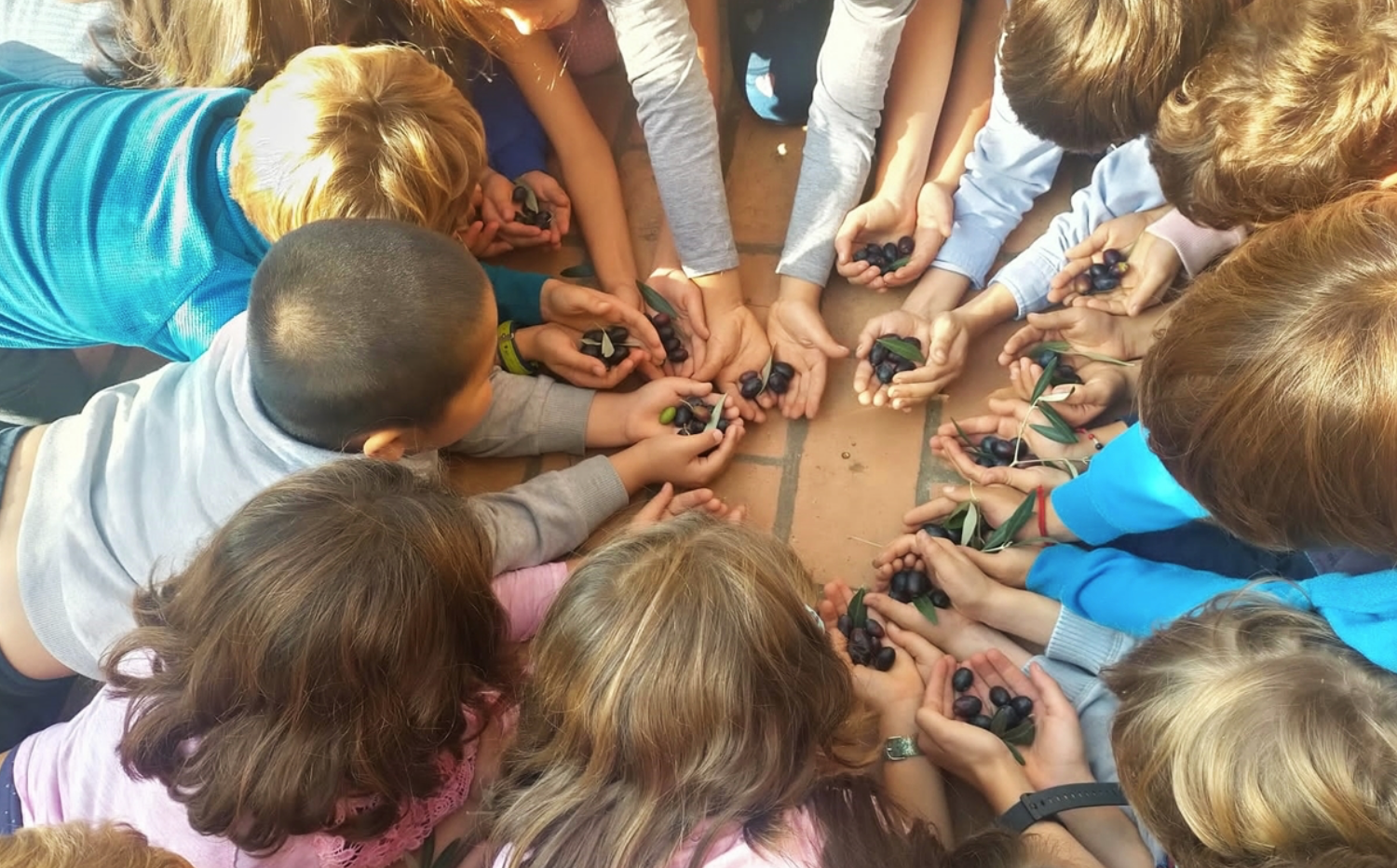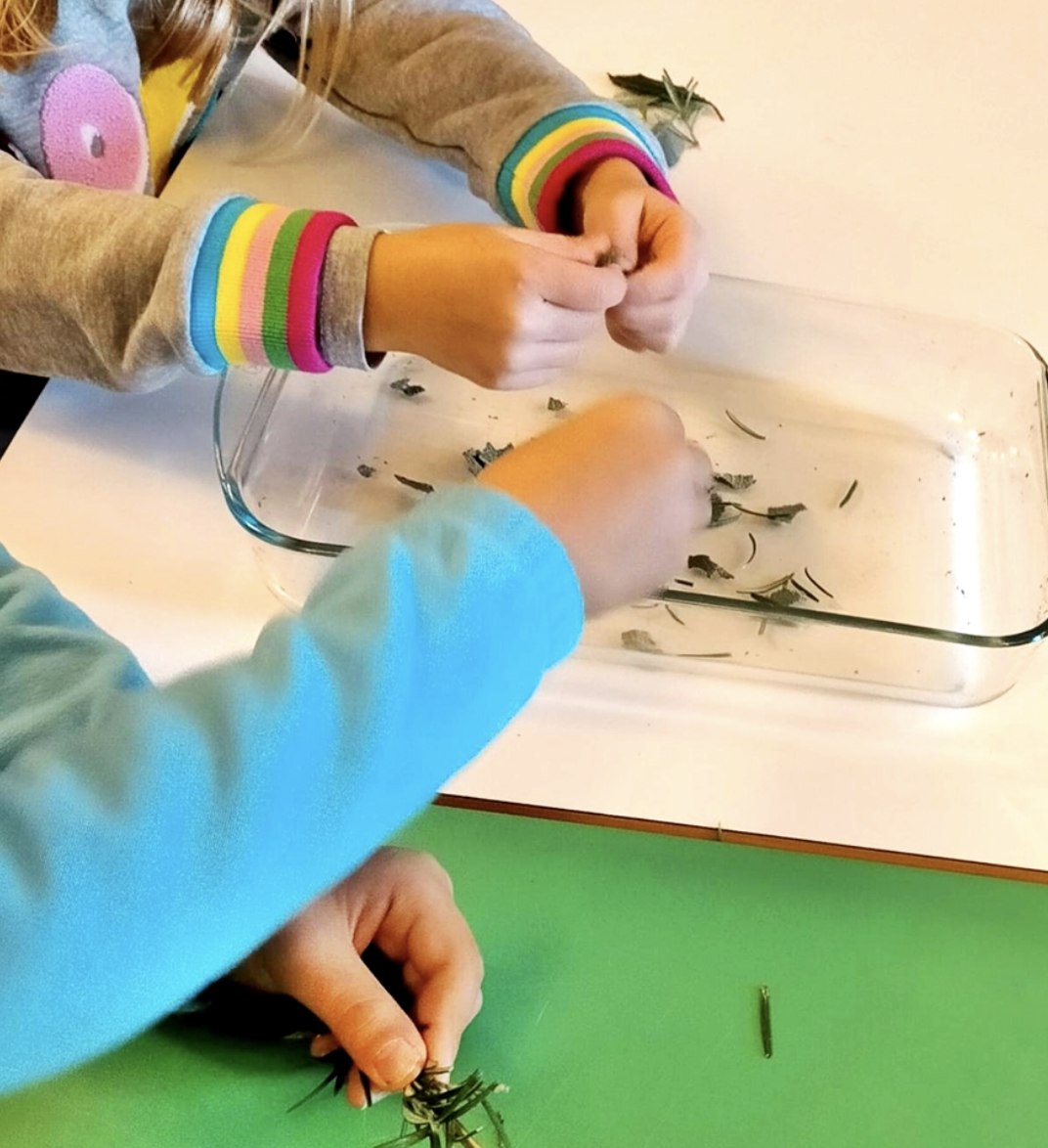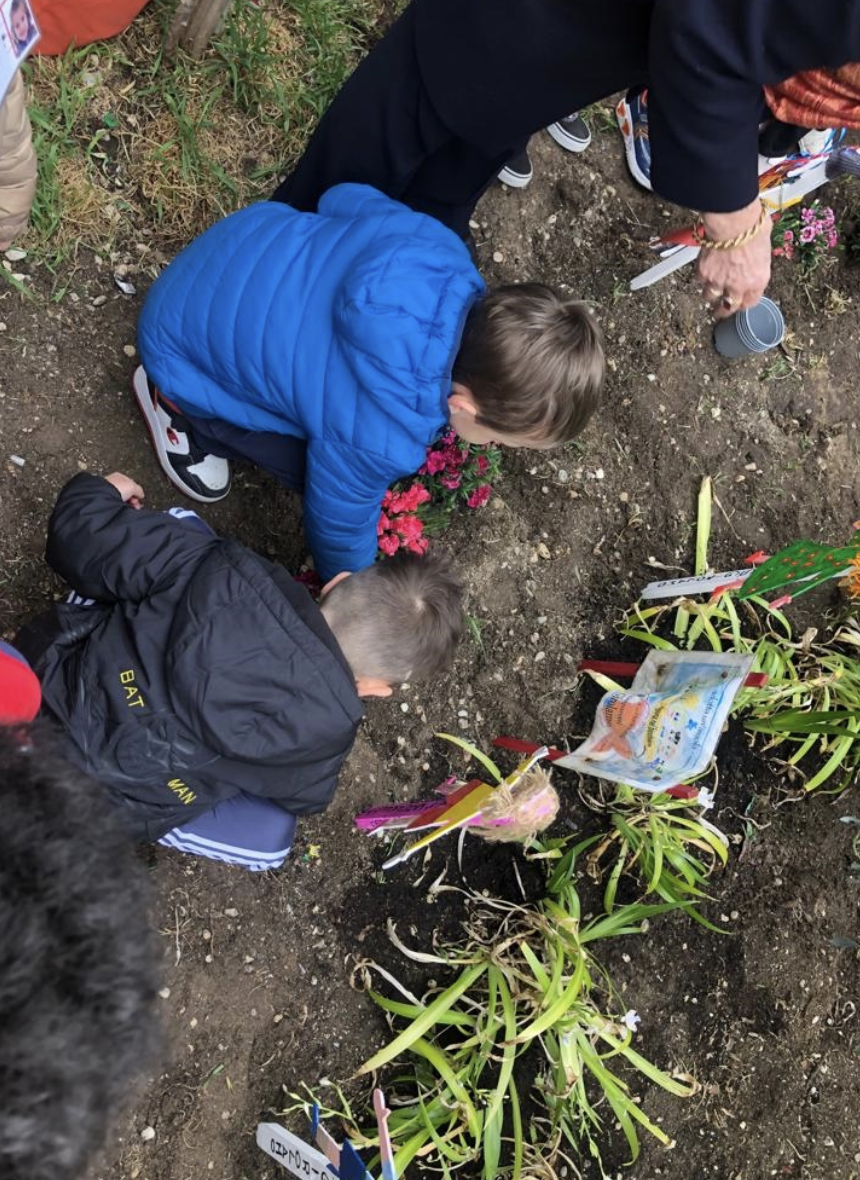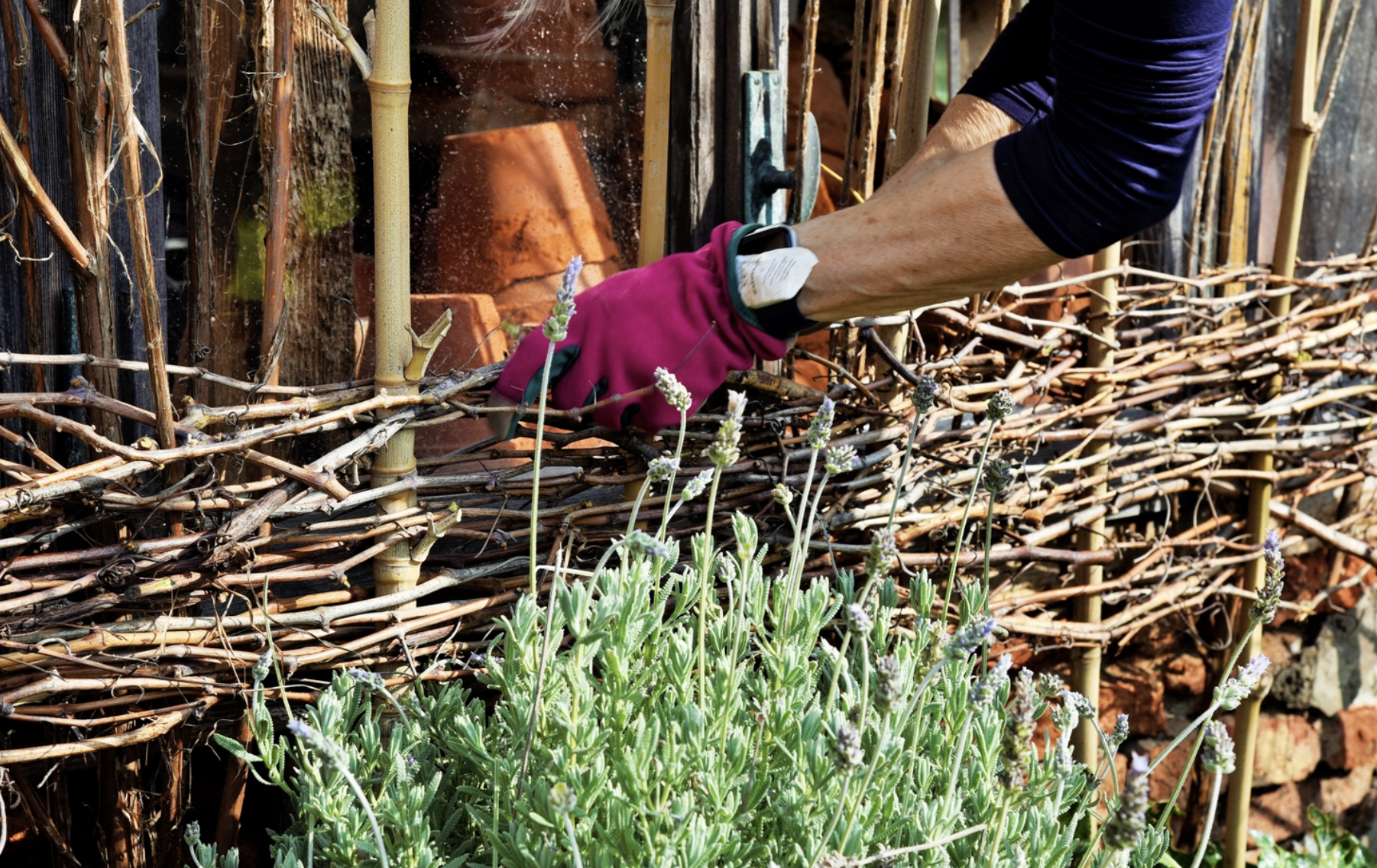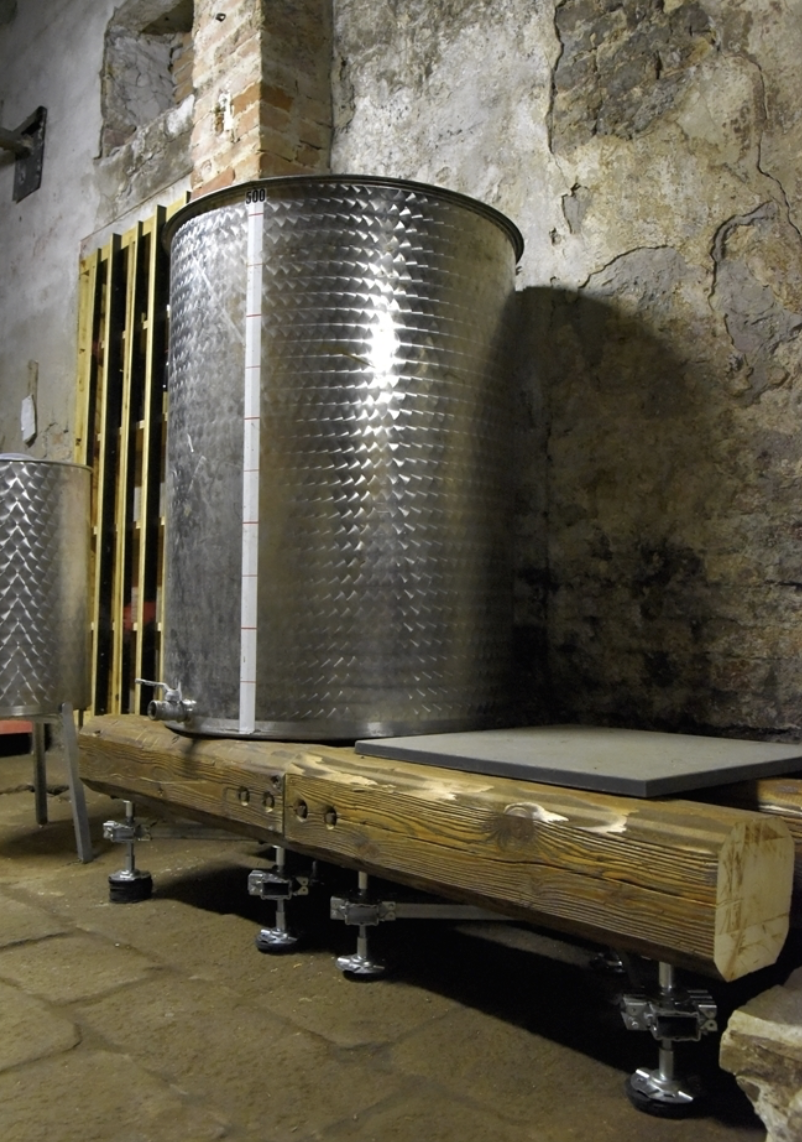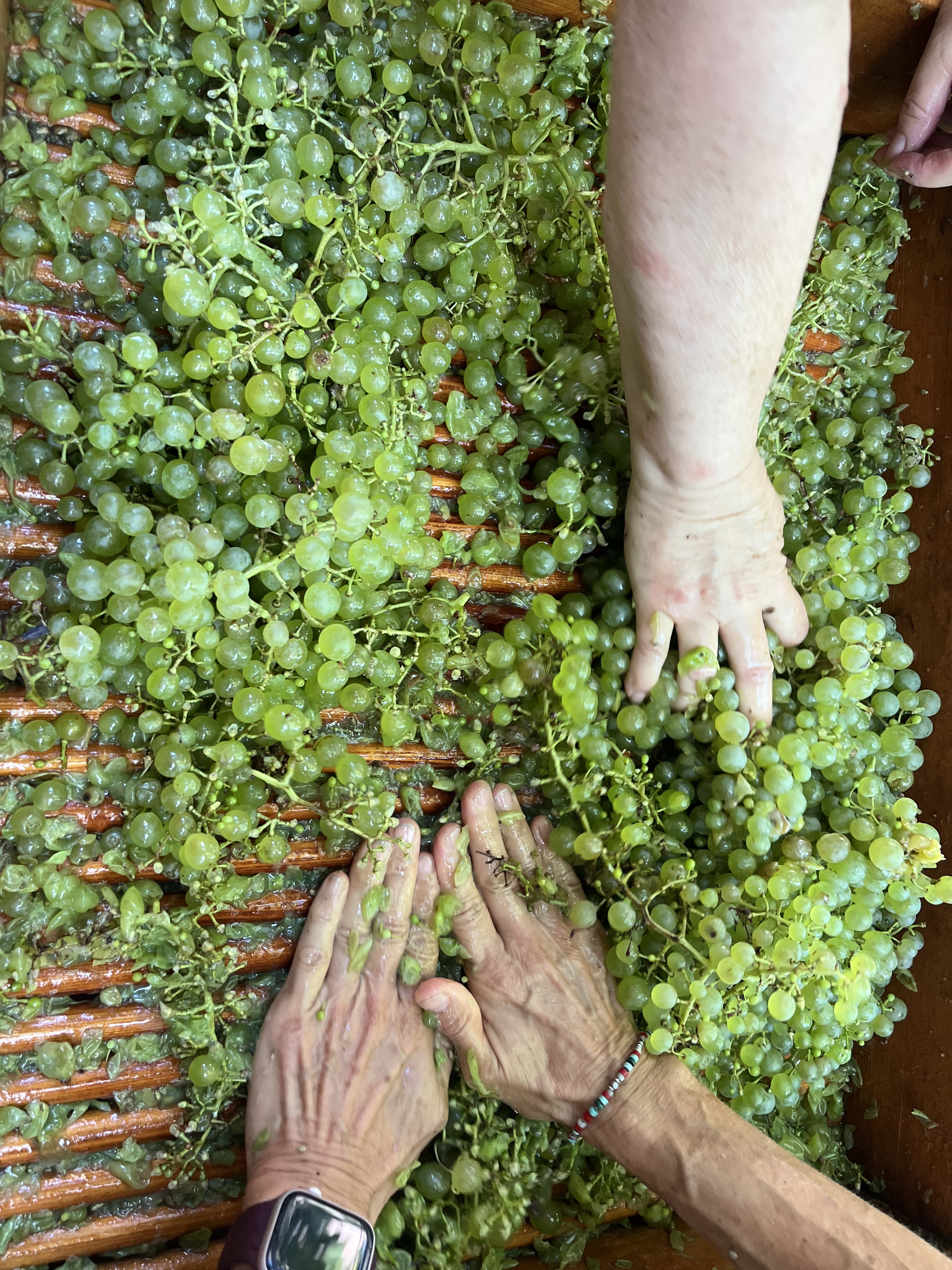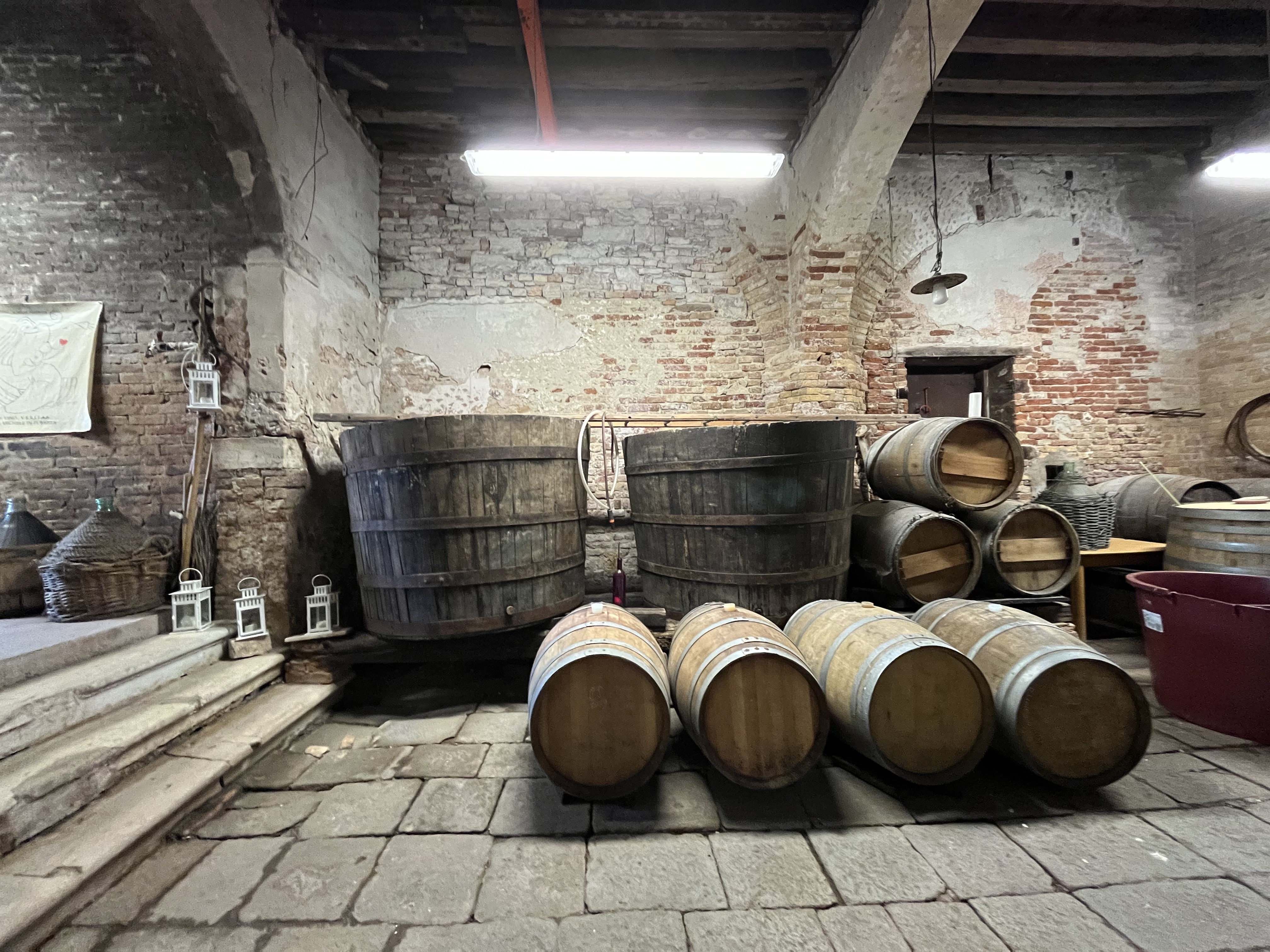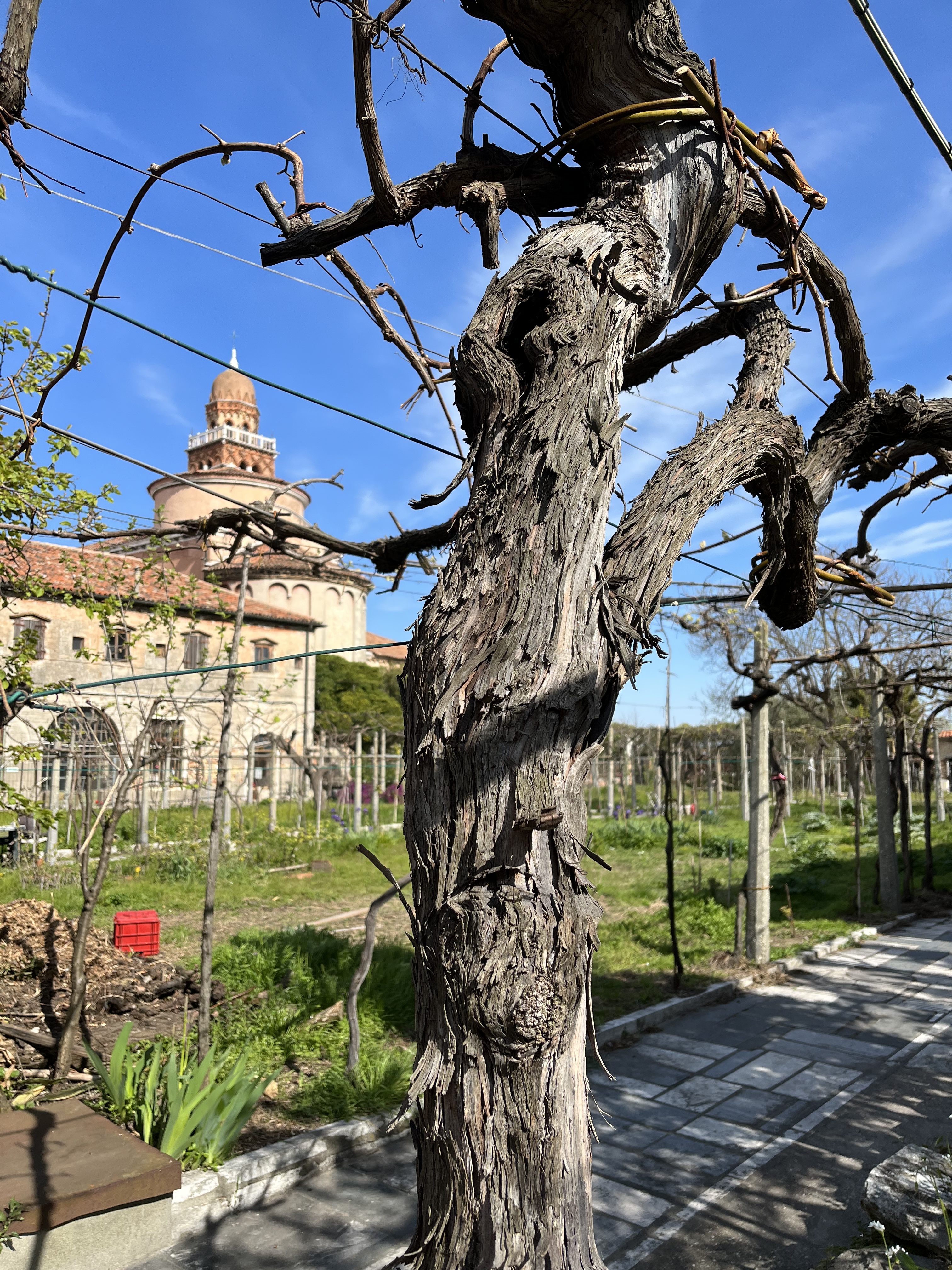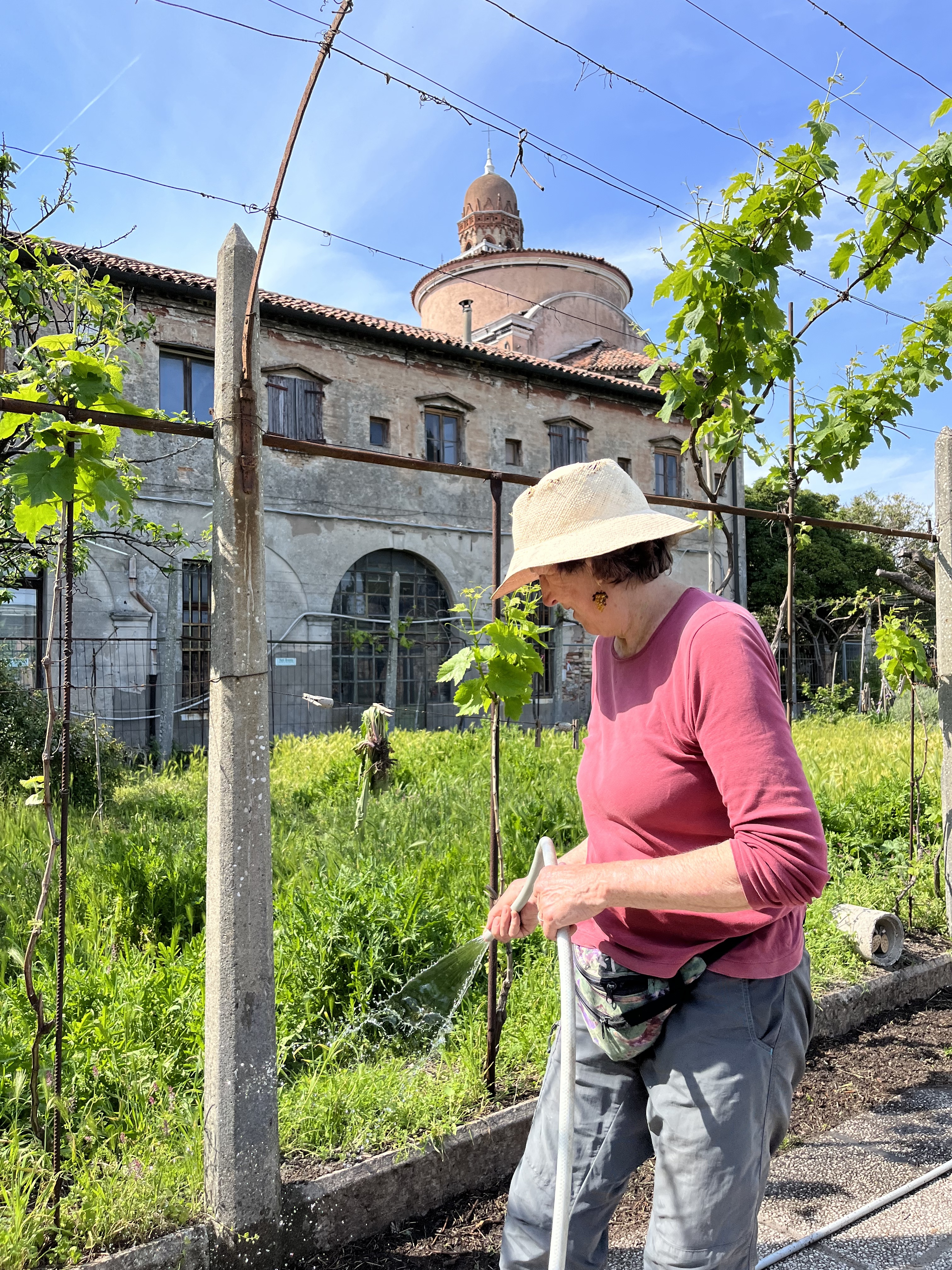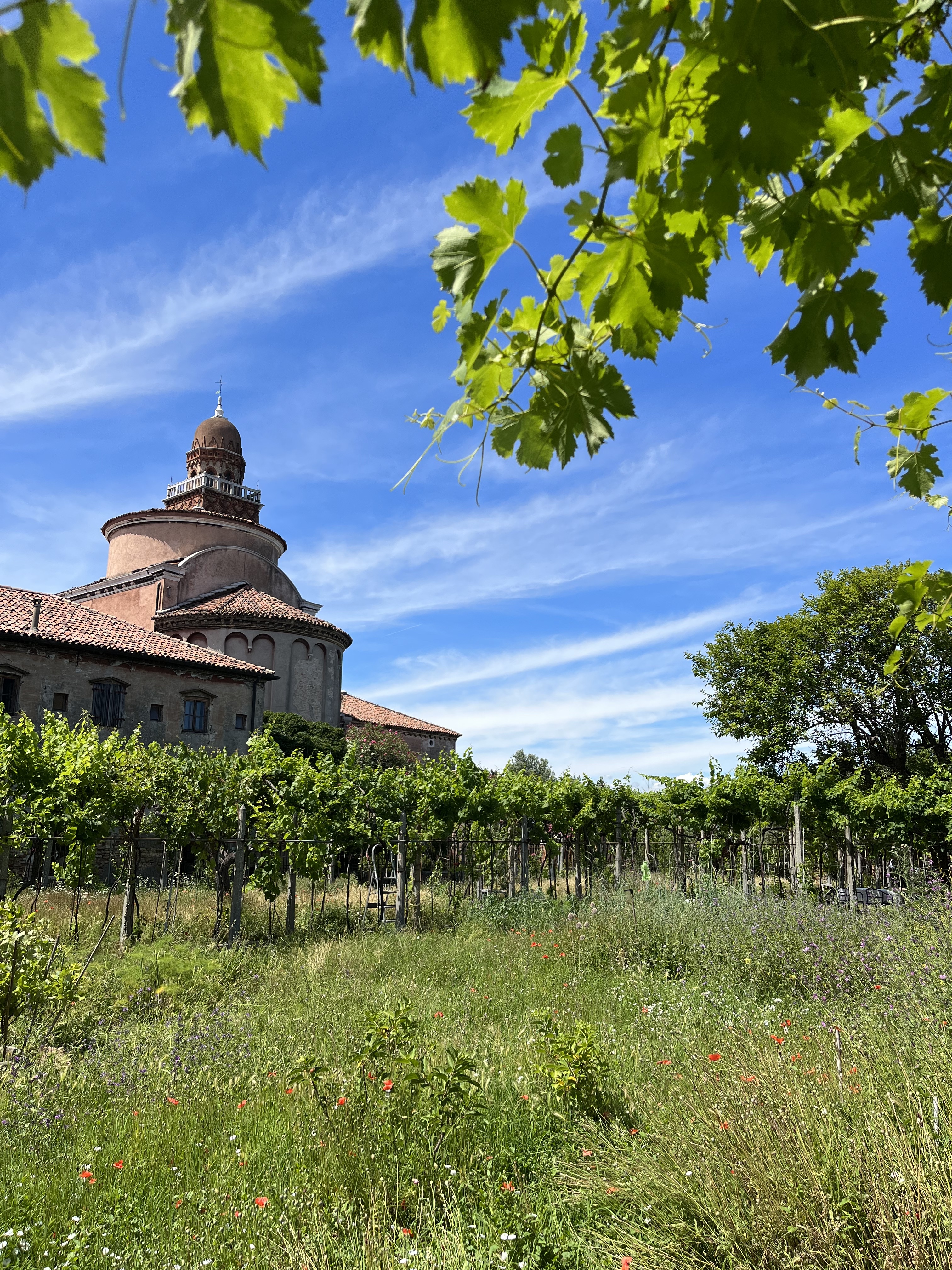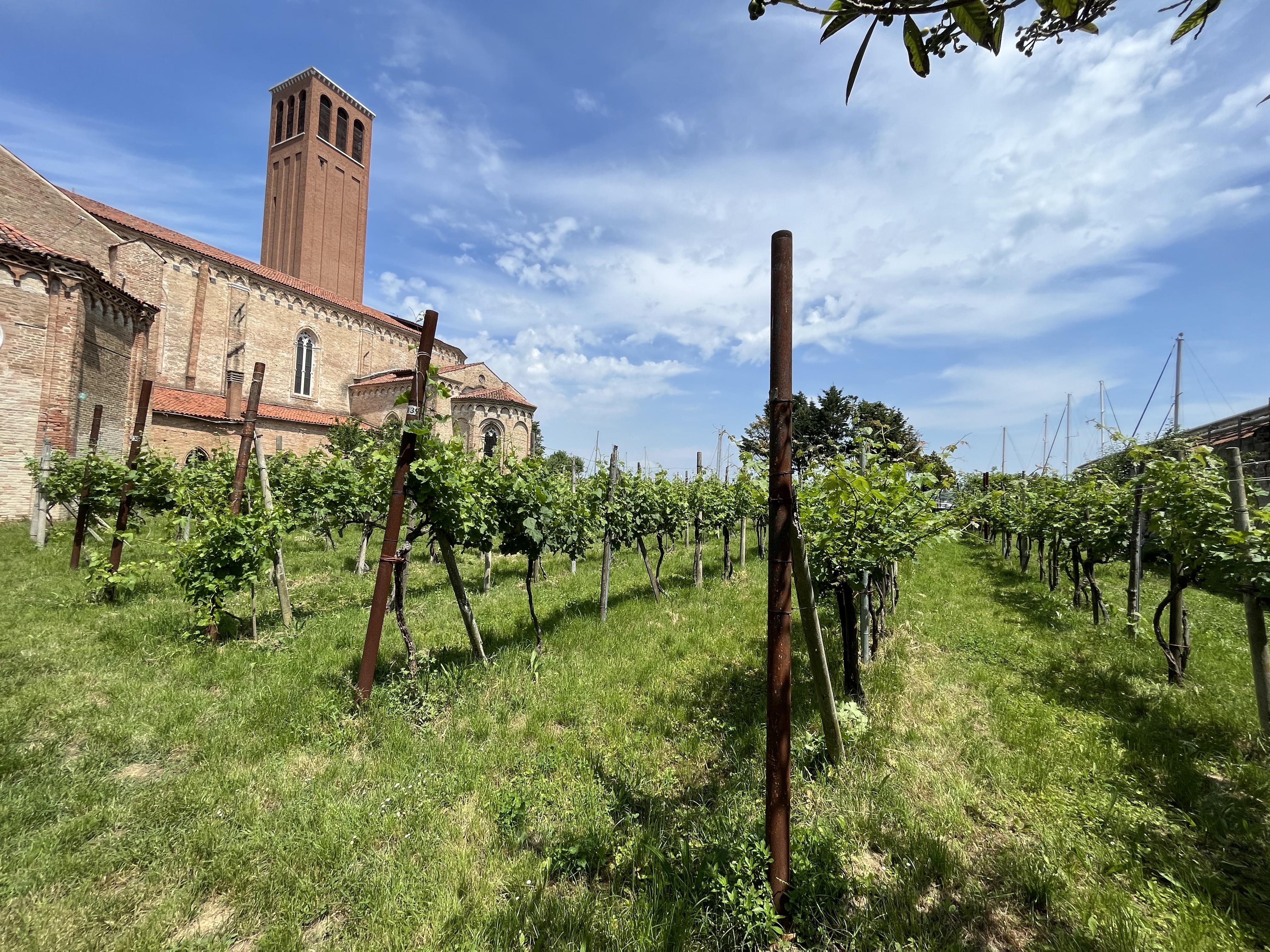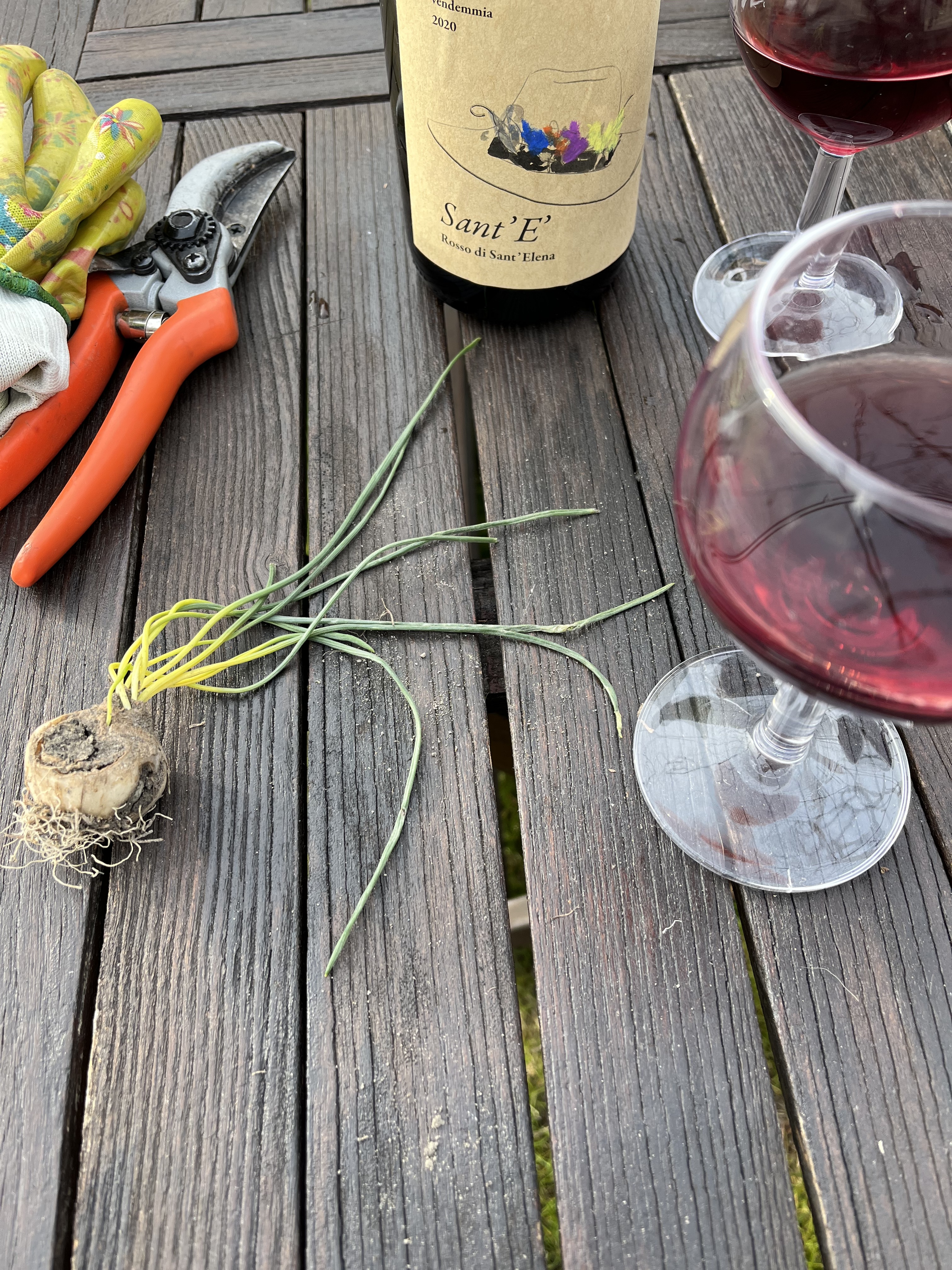Regaining a sense of belonging
Laguna nel Bicchiere, Le vigne ritrovate
Laguna nel Bicchiere: reviving the Venetian Lagoon’s nature-cultural heritage through its community
“Laguna nel bicchiere – le vigne ritrovate” aims at (re)building the fragmented Venetian social fabric by regenerating forgotten vineyards, gardens, and orchards scattered across the lagoon of Venice, Italy. It seeks to revive the city’s overlooked historical urban-rural relationship, enhancing a renewed sense of belonging through sustainable, collective, and care-full land stewardship. Its fruits foster the ties among such a diverse, intergenerational community in a symbolic glass of wine.
Italy
Local
Venezia
It addresses urban-rural linkages
It refers to other types of transformations (soft investment)
Yes
2024-12-01
No
No
No
As a representative of an organisation
“Laguna nel bicchiere – le vigne ritrovate” (Lagoon in a Glass – The Rediscovered Vineyards) is a local association and project deeply engaged in the community (re)building of the fragmented Venetian social fabric by restoring its hidden agricultural heritage. In a city grappling with the devastating effects of over-tourism, population decline, and an aging demographic, the project offers a meaningful alternative: regenerating forgotten vineyards, gardens, and orchards scattered across the lagoon. The association seeks to revive the city’s overlooked historical urban-rural relationship, fostering a renewed sense of belonging and community through sustainable, collective, and care-full land stewardship. By safeguarding traditional agricultural practices and preserving the lagoon’s distinctive landscape, it creates a space where cultural heritage, environmental sustainability, and social inclusion intersect. With a program run by hundreds of volunteers since 2008, the association involves citizens of all ages and many nationalities in its activities–from kindergartens and primary schools to universities and retirement homes. It preserves traditions, passing them on to young people and making them known to the less young or the “differently young” in a playful but serious intergenerational exchange. The association successfully transformed neglected spaces into vibrant community hubs, enhancing social cohesion through collective environmental stewardship. In a lagoon increasingly threatened by rising sea levels and climate change, these restored green spaces serve as a symbol of resilience and future hope. The fruits grown and gifted by the land thanks to an experimental, playful collective reimagining of the traditions are what fosters the ties among such a diverse inter-generational group of people and more than human entities, bringing them with the whole historical nature-cultural lagoon’s landscape in a symbolical single glass of wine: a shared sense of belonging.
community cohesion
nature-cultural forgotten heritage regeneration
intergenerational community exchange
care-full land stewardship
bottom-up resilience
At the core of Laguna nel Bicchiere lies a commitment to sustainability that extends beyond mere preservation; it embraces regeneration, circularity, and the repurposing of abandoned spaces. In the fragile context of Venice, where environmental pressures and social fragmentation threaten its social fabric, our project demonstrates how sustainable stewardship toward the urban’s agricultural and cultural heritage can intertwine with ecological responsibility to create a thriving, resilient community. By adopting neglected vineyards, olive groves, and aromatic herb gardens across the Venetian lagoon, we collectively breathe new life into landscapes that would otherwise fall into disrepair. We prioritize traditional, autochthonous plant species that support local ecosystems, and we have introduced bee houses to encourage pollination and enhance biodiversity. Furthermore, sustainability is not just about nature—it’s about people. Our intergenerational learning programs connect children, students, experts, and elders, ensuring that the principles of ecological responsibility and heritage conservation are passed down through meaningful hands-on experiences. The educational projects ensure that children are taught the complexity behind the food production system and how to make it sustainable. Experts from different disciplines teach us ancient vineyard and plant care techniques, such as binding the plants with willow branches and nurturing them with our compost. Our initiative also integrates circular economy principles: i.e., leftover materials from the Architecture Biennale have been repurposed to restore our wine cellar and tool sheds, while every liter of olive oil or jar of herbal salt produced by children feeds back into the system, donating the offers received to Slow Food projects in Africa with whom Venetian children entertain an epistolary exchange with African ones, ensuring a positive impact beyond the local scale.
By restoring abandoned vineyards, olive groves, and aromatic gardens, once cultivated by monks in now-abandoned monasteries, Laguna nel Bicchiere revives the deep nature-culture heritage of the Venetian lagoon. It transforms neglected, beautiful, and harmonious spaces into vibrant, living landscapes where history, tradition, and the present merge, offering a deep sensory and emotional experience to those who engage with it. Beauty, in our project, is about creating meaningful encounters between people, places, and history. The vineyards and gardens we restore are more than agricultural sites; they are cultural landscapes, where each vine and olive tree witness an old lifestyle and historical time in a contemporary nexus. Taking care of these cultural landscapes is a multisensory journey—the scent of wild herbs, the texture of the soil, and the changing colors of vines through the seasons—all awaken a connection to nature in the unique heritage of Venice’s hidden greens. Moreover, these spaces offer a chance to experience Venice beyond its postcard image, rediscovering its rural soul and its fragile balance with the lagoon ecosystem and its inhabitants. In this context, Laguna nel Bicchiere acts as a connector, providing opportunities for people to meet, work together, and share knowledge, creating a sense of belonging through collective care for the land. Whether it’s children planting or harvesting guided by elders, university students engaging in research, or our international group of volunteers experiencing Venetian traditions firsthand, these encounters generate deep social and emotional bonds that go beyond generational and cultural divides. The simple act of tending to plants together becomes an act of mutual care—not only for the land but for each other. Beauty is not just preserving the past—it evolves with the present and works toward a future, hopefully, guided by the mutual care values the association brings forward.
Laguna nel Bicchiere believes that true inclusion means creating spaces where everyone, regardless of age, ability, background, or origin, can feel a sense of belonging and purpose. In a city like Venice, where local communities are shrinking under the pressures of over-tourism and depopulation, this project rebuilds human connections by making participation accessible to all. The vineyards, olive groves, and gardens we restore are open living environments where diversity flourishes, just like the biodiverse plants we cultivate. Our project welcomes a broad spectrum of participants: children, students, and local and newcomer residents, including those who may feel isolated due to age or physical or mental health. Some of our members are lifelong “differently young” Venetians; others are "acquired Venetians"—newcomers who have made the city their home but struggle to feel fully integrated. In our vineyards, everyone works side by side, encouraging mutual respect and support. Elders, who may otherwise face loneliness, find a renewed sense of purpose and connection, while younger generations learn agricultural traditions and the values of solidarity, patience, and care for both people and the environment. The project embraces a more-than-human perspective, recognizing that inclusion is not only about people—it’s also about integrating the natural entities that co-inhabit these spaces: the vines, the olive trees, the pollinators, the soil itself, all are active and living parts of the project. This holistic approach fosters an empathetic connection with the environment. Since 2008, our yearly educational program, "Guardo Crescere e Cresco" (I watch nature grow, and I grow within), has introduced hundreds of children to these values. Through hands-on participation in vineyard restoration and environmental stewardship, young participants learn that inclusion is not just a concept—it is something that must be practiced and cultivated, just like the land they tend.
Laguna nel Bicchiere was born from a grassroots initiative as a school project led by Professor Flavio Franceschet and the students of Scuola Media Calvi, which soon grew into a much larger movement involving people who shared a passion for preserving these nearly forgotten urban-rural landscapes in the lagoon. Local communities are the driving force behind every decision, action, and transformation of the association’s projects. Volunteers, regardless of their background, experience, or availability, are all equally involved in the co-design, decision-making, and implementation phases of each sub-initiative. The project thrives on a model of shared responsibility and continuous regeneration, where each individual, by offering their free time and expertise, actively shapes the association. Laguna nel bicchiere’s work has grown around the (once) abandoned vineyards of San Michele Island, Sant’Elena, Giudecca, Malamocco, and Le Vignole. The most distinctive aspect of community participation is the hands-on involvement in every step of the winemaking (and many other) processes. Every year, volunteers together with schoolchildren harvest the grapes together, carefully selecting each bunch. In San Michele, in the heart of the old Franciscan monastery, the grapes are gently destemmed, pressed by foot, and placed in vats, where natural fermentation begins—without additives, chemicals, or artificial interventions. While wine production remains the symbolic heart of the project, Laguna nel Bicchiere extends far beyond it. Every year, about 300 children take part in the association’s educational programs, engaging in the protection also of olive trees scattered throughout the lagoon. This has led to the recent production of “olio extravergine di laguna” oil, another example of how local participation continues to expand the project’s impact and legacy through a self-sustaining, circular model of community participation.
Laguna nel Bicchiere links stakeholders at the local, national, and international levels. By encouraging meaningful exchanges both horizontally, among peers and partners, and vertically across different institutional scales, the project creates a dynamic and interconnected ecosystem of knowledge-sharing, research, and cultural engagement. At the local level, it interacts with educational institutions, research centers, and community groups. The free educational programs “Adotta l’aiuola” (Adopt a Green Space) and “Guardo crescere e cresco” involve kindergarten and primary school children. Free exchange moments involve students of Tourism and Hospitality High Schools to traditional and natural enology, learning about winemaking as a cultural practice deeply embedded in Venice’s history. Volunteer students from local Universities (IUAV & Ca’ Foscari) developed their Master’s and PhD thesis research exploring topics like soil quality, post-anthropocentric practices, and regenerative urban agriculture. The project is featured in the New European Bauhaus initiative hosted by IUAV. The project collaborated with the German Pavilion and the Lithuanian Pavilion from the Biennale, by refurbishing the wine cellar and tool sheds and constructing a fence for the composting area in one of the vineyards using upcycled materials. At the national level, the project collaborates with agricultural research institutions, i.e., the Agriculture Department from Padua and Verona Universities, to conduct studies on the age and variety of grapevines, to map and preserve Venice’s viticultural heritage. At the European and international level, Laguna nel Bicchiere is a founding member of a network of urban vineyards, UVA (Urban Vineyards Association), exchanging knowledge, methodologies, and best practices with partners across continents. The project was showcased at Expo Dubai 2020 and featured in 2022 at the 6th UNWTO Global Conference on Wine Tourism.
Laguna nel Bicchiere thrives on a transdisciplinary approach, where formal scientific research, traditional local knowledge, artistic expression, and community engagement intersect. The project bridges different forms of expertise: elderly Venetians and winemakers share their generational expertise on viticulture, agriculture, and soil management, ensuring that the project preserves and revitalizes forgotten agricultural traditions. From kindergarten to university students, younger generations learn from direct experience with the association volunteers. The association collaborates with experts across multiple academic fields, including Botany & Agrifood Studies to preserve plant biodiversity and soil quality; Chemistry & Enology to explore natural fermentation processes in winemaking; Philosophy & Ethics to explore the project’s post-anthropocentric care for the more-than-human world; Education & Pedagogy to integrate experiential place-based environmental learning into schools; Anthropology & Social Sciences to explore how urban agriculture can counteract social fragmentation, depopulation, and over-tourism in Venice; Arts, Poetry & Cultural Narratives through initiatives like “Arte in Vigna”, where artists, poets, and performers engage with the project to create new aesthetics. The interaction between these fields actively shapes the way Laguna nel bicchiere is designed and implemented, developing a beyond-disciplinary ecosystem of theories and practices where resilience is reached through diversity. Education programs create an intergenerational learning model, making the vineyard a living classroom for sustainability and cultural heritage. Researchers from theUniversities collaborate to study and restore autochthonous grape varieties. “Arte in Vigna” fosters creative expressions to reimagine the role of nature in the city. Their involvement creates a shared sense of ownership, where all participants contribute to and benefit from the project in different ways.
Unlike conventional sustainability and cultural heritage projects, which often follow top-down decision-making structures, Laguna nel Bicchiere, is born from a grassroots initiative and built on a completely flat, open, and fluid model of participation. Its radical departure from hierarchical governance allows for a truly bottom-up, collective, and evolving initiative where every participant can actively shape the project. Most projects in urban agriculture, heritage preservation, or environmental sustainability operate within structured frameworks, often led by institutions, municipalities, or private enterprises. These projects typically rely on clear divisions between experts, decision-makers, and beneficiaries and focus mainly on preserving the past rather than adapting and evolving traditions. Laguna nel Bicchiere disrupts these norms through a non-hierarchical, self-organizing model with no fixed leadership (besides a formal 10-member directive, changing every three years to discuss and approve the association activities). Decisions are made collectively through a democratic approach, and new ideas emerge organically from within the community. Everyone, from long-term members to first-time volunteers, can contribute as much or as little as they can, whenever they can. There is no gatekeeping, only a shared commitment to the land, the city, and its people. The initiative remains flexible and adaptable, constantly reshaping itself based on the input and energy of those involved. People come and go, but the project continues to grow and regenerate like a wild meadow. Moreover, unlike conventional urban or environmental projects, Laguna nel Bicchiere does not see nature as something to be managed. Instead, it engages with the land, vines, and ecosystem as active participants in the process, redefining sustainability as an interdependent relationship between humans and the natural world from a more-than-human perspective.
Laguna nel Bicchiere’s methodology is rooted in a unique blend of historical traditions, contemporary scientific insights, and experiential learning. It prioritizes learning through doing and embraces the uncertainties of a changing climate to create a radically innovative model for sustainable land stewardship and cultural regeneration. In viticulture, it reintroduces age-old practices once integral to the Venetian lagoon’s ecosystem. For instance, grapevines are bound with willow branches instead of synthetic materials, and wine is produced entirely by hand, following centuries-old enological techniques. The Venetian Lagoon presents a unique and challenging ecosystem for agriculture, shaped by rising sea levels, soil salinity, and unpredictable weather patterns. Laguna nel Bicchiere adopts a resilient, adaptive, and experimental methodology, where trial and error is a deliberate and essential part of learning. For example, the impact of high tides (acqua alta) on vineyard health has been tried to counterbalance by developing natural soil-reinforcement practices. Beyond viticulture, the methodology extends into education, biodiversity conservation, and cultural transmission. Educational programs immerse schoolchildren in hands-on environmental learning experiences. The methodology encourages active participation from students, elders, winemakers, artists, researchers, and citizens, breaking down barriers between expert and non-expert knowledge. The project’s decentralized structure ensures that new ideas and methods are constantly introduced, allowing it to remain adaptive and responsive. One of the project’s defining features is its commitment to reconnecting with Venice’s lost agricultural heritage. Through the initiative “Alla Scoperta di…” (“Let’s discover…”), members explore the lagoon and mainland, uncovering remnants of monasteries, gardens, historic vineyards, and artisanal food production sites.
Laguna nel Bicchiere offers a highly adaptable and replicable framework that can be applied to any location where abandoned green spaces, agricultural heritage, or forgotten landscapes exist in urban areas side by side with a community of people wishing to (re)establish their relationship with the land they inhabit. What makes this model transferable is the methodology and organizational approach, which can be reshaped to fit different social, environmental, and cultural contexts. The project’s core idea—bringing new life to neglected natural and cultural landscapes—can be applied anywhere in the world where unused green spaces exist, with a community-led, bottom-up approach combining traditional ecological knowledge with scientific research. Following a non-hierarchical, open-source structure where anyone can contribute ensures long-term participation and engagement, encouraging collective ownership and empowering local communities to reclaim and care for their own landscapes. The educational component of the project—learning through doing, trial and error, and real-world engagement—is scalable both to schools and community groups. Programs like Guardo Crescere e Cresco, which involve schoolchildren in long-term environmental projects, could be adopted by schools worldwide to create meaningful connections with local nature and history. What makes Laguna nel Bicchiere unique is its open-ended, participatory, and flexible nature. It is not a rigid project but a framework for action that can be adjusted, reinterpreted, and reshaped according to the needs of different places and communities. By prioritizing community-led engagement, integrating scientific and traditional knowledge, and emphasizing hands-on learning, this model can be used anywhere.
Laguna nel Bicchiere offers a localized, hands-on response to pressing global issues like climate change, social fragmentation, and the abandonment of nature-cultural heritage. Through a model deeply rooted in community engagement, ecological restoration, and intergenerational exchange, it demonstrates how small-scale, place-based interventions can create meaningful global impact. At its core, Laguna nel Bicchiere addresses the modern crisis of detachment from place and heritage. In a city where urban communities are fragmented, atomized, and slowly disappearing, it offers an opportunity to reconnect them through the care of the land and its nature-cultural heritage in a meaningful and tangible way. By encouraging the community to physically engage with its environment, the project reclaims a space for local life, traditions, and stewardship. In addition, it tackles social isolation, particularly among the elderly, by providing a powerful antidote to loneliness, nurturing intergenerational exchange, and community-led action. Moreover, it directly addresses climate resilience. The Venetian Lagoon—an environment uniquely vulnerable to rising sea levels, salinization, and land erosion—revives centuries-old sustainable farming techniques to grow resilient areas. Growing an ancient mix of bio-diverse plant varieties in the same field or planting olive trees to avoid land erosion integrates traditional agricultural wisdom with modern scientific knowledge to climate adaptation. The use of natural materials and the application of closed-loop organic farming (where pruned vines are composted to enrich the soil) minimize environmental impact. Through hands-on education, the community learns how to observe environmental changes, experiment with solutions, and develop adaptive strategies—skills that are increasingly critical in the face of a warming planet.
Laguna nel Bicchiere has achieved significant results in heritage preservation, community engagement, education, and cultural revitalization, making a tangible impact on both direct and indirect beneficiaries. Locations regenerated, are: Orto didattico “San Michele,” Orto didattico “Giudecca-IRE,” Isola di San Servolo, Giardini della Biennale, Orto della Chiesa di Sant’Elena, and Giardino del Palazzetto Bru Zane. The beneficiaries are: volunteers community members (about 300/year); children/students (2021–22: 322, 2022–23: 300, 2023–24: 310, 2024–25: 286) from numerous schools (kindergartens San Francesco, Comparetti, Cristo Re, and Maria Pezzè Pascolato; primary schools Armando Diaz, Bernardo Canal, Giacinto Gallina, San Girolamo, and Alessandro Manzoni); other local educational institutions, artists, researchers, and winemakers. The project has gained national and international recognition, appearing on TV programs on RAI, Mediaset (Italy), France TV, France 2, SWR-Südwest Rundfunk, and BR-Bayrischer Rundfunk (ARD1, Germany). It has been reported by major newspapers and magazines such as Repubblica, Corriere della Sera, Il Sole 24 Ore, and La Stampa, alongside 25 specialized publications, including Lufthansa’s Bella, Volare, Ferrovie Italiane Magazine, Gambero Rosso, Diario El País, Vanity Fair, and Forbes. It was showcased in a film, “L’Annata – La Ballata dei Vignaioli di Laguna” (2023, by Andrea Mignòlo), First Prize winner for the Most Festival (Barcelona, 2024). The project’s impact has been formally acknowledged with the Masi International Award for the Civilization of Wine (2013), a prestigious honor that celebrates initiatives preserving and innovating viticultural traditions. Since the website’s relaunch in 2022, Laguna nel Bicchiere has significantly expanded its reach online, with 85,195 visitors, 151,768 pages viewed in 2022; 60,472 visitors, 162,823 pages viewed in 2023; 70,418 visitors, 217,761 pages viewed in 2024.



